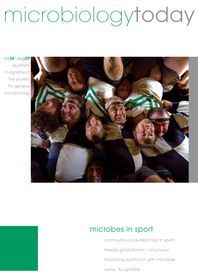Microbes in sport
10 August 2009 publication
The lead articles of the August 2009 issue of Microbiology Today are on community-acquired MRSA in sport; herpes gladiatorum - scrumpox; improving sports turf with microbes; and swine flu update.
Can I catch MRSA from playing sport? - Jodi Lindsay
Meticillin-resistant Staphylococcus aureus (MRSA) is usually associated with hospital infections, where it can cause severe illness in the immunocompromised and elderly, particularly people with wounds where the bacteria can get in. Jodi Lindsay tells us about a novel strain of MRSA found in the USA that is causing concern. Called Community-acquired-MRSA (CA-MRSA), the bacteria can cause infection in healthy people and several outbreaks in contact sports teams have been reported.
Herpes Gladiatorum: a combative virus disease - Julia Colston and Judy Breuer
Players of contact sports like rugby and wrestling can end up with an infection caused by Herpes Gladiatorum (HG), a virus belonging to the herpes family. It gets into the body through cuts and abrasions and the disease is sometimes called scrumpox. Like all herpes viruses, once contracted, HG can remain dormant in its host and reactivate at any time. Julia Colston and Judy Breuer take a look at this unpleasant disease and show how it can even wreck an athletic career.
Can microbes be used to produce ‘greener’ sports turf? - Alan Gange
With football managers blaming the state of the pitch for the failure of their teams to win big matches, anything that improves the condition of turf can only be welcome. Alan Gange describes how mould diseases can devastate the sward and some work being done to exploit the power of beneficial microbes to act as ‘biostimulants’ and improve the health of turf grasses.
Comment: Sw-H1N1-ng on about ‘flu again - Wendy Barclay
Swine ‘flu is currently sweeping through continents and the UK has been particularly badly affected. The World Health Organization has declared a pandemic. Internationally renowned influenza virologist Wendy Barclay discusses how effectively we have been prepared to cope.
Schoolzone
Couch potato or elite athlete – finding the balance between a sedentary life style and taking keeping fit too seriously isn’t easy. Moderate exercise has been shown to promote a reduced propensity to infections, but overdoing it can lead to impairment of the immune system, as Dariel Burdass describes. Plus the history of MiSAC as it turns 40, along with 2009 MiSAC competition results, a book review and news of a grant for teachers.
Gradline
Jane Westwell explores the options for an academic career in the USA by interviewing SGM member Vatsala Maitin, who is an Assistant Professor in Molecular and Cellular Nutrition in Texas. Federico Dorati shares his experiences of UK schemes designed to help the personal development of science PhD students and Mark Clements tries out the Crucible scheme run by NESTA.
Going Public
Podcasting, websites, outreach activities in schools, press releases on SGM journal papers – all are different ways of promoting microbiology to the world covered in this edition of Going Public.
Cover image: Bob Thomas/Getty Images

